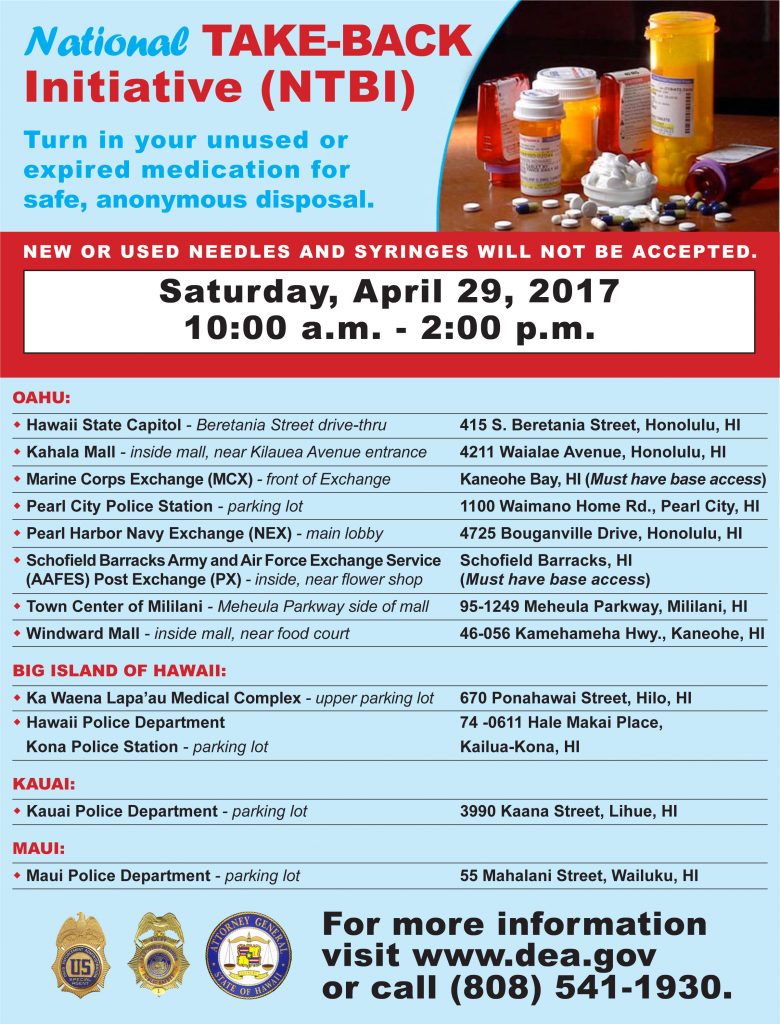Drug Take-Back Event Scheduled for Kona, Hilo
 The Department of the Attorney General is again partnering with the Drug Enforcement Administration and State Narcotics Enforcement Division, Department of Public Safety to coordinate a prescription drug take-back event on Saturday, April 29, 2017, from 10 a.m. to 2 p.m. at collection points in Hilo and Kona, and on other islands.
The Department of the Attorney General is again partnering with the Drug Enforcement Administration and State Narcotics Enforcement Division, Department of Public Safety to coordinate a prescription drug take-back event on Saturday, April 29, 2017, from 10 a.m. to 2 p.m. at collection points in Hilo and Kona, and on other islands.
This will be the DEA’s 13th National Take-Back Initiative for the state of Hawai‘i.
Anyone with expired or unused prescription medications is encouraged to bring their medications to the collection sites. See the image above for a list of designated collection sites, or visit www.dea.gov or www.ag.hawaii.gov to learn more.
This service is free and anonymous—no questions asked. Tablets, capsules and all other solid dosage forms of medication will be accepted. New or used needles and syringes will not be accepted.
The Take Back Initiative provides a safe and friendly way to dispose of unused drugs.
“As you do your spring cleaning, take advantage of this opportunity,” said Attorney General Douglas Chin.
“Prescription drug abuse in Hawai‘i continues to be a concern and DEA is pleased to be working once again with the community as well as our state local partners to support the National Take Back Initiative,” Robin Dinlocker, DEA assistant special agent in charge.
“Since 2010, the state Department of Public Safety, Narcotics Enforcement Division, has been an avid supporter of the DEA National Prescription Take-Back Initiative, which continues to be a well-received opportunity for the public to properly discard of their expired and unwanted medications,” said NED Administrator, Jared Redulla. “As the abuse of medication continues to climb at a consistent pace across our state and the nation, the State of Hawai‘i is dedicated to protecting its communities from the diversion and abuse of stored, unused medications and the prevention of medications finding their way into our precious lands and water systems. We encourage our communities to join the DEA, state and local enforcement partners by bringing their unwanted medications to one of the various collection sites across the state.”
In Hawai‘i from September 2010 through October 2016, over 24,500 pounds of pharmaceuticals have been safely collected and disposed of at 12 take-back events.
Nationwide, the take-backs have collected a total of 3,601 tons of pharmaceuticals.
Unused or expired medicine should be disposed of properly when it is no longer needed for the illness for which it was prescribed.
- Medicines may lose their effectiveness after the expiration date.
- Improper use of prescription drugs can be as dangerous as illegal drug use.
Having unused or expired medicine in your home increases the risk of accidental poisoning.
- Homes where children or the elderly live are especially vulnerable to this danger.
- People may mistake one type of medicine for another type. Children may mistake medicine for candy.
Unused or expired medicine should not be thrown in the trash or flushed down the toilet.
- Proper disposal helps reduce the risk of prescription drugs entering a human water supply or potentially harming aquatic life.
For more information, visit www.dea.gov or www.ag.hawaii.gov.














